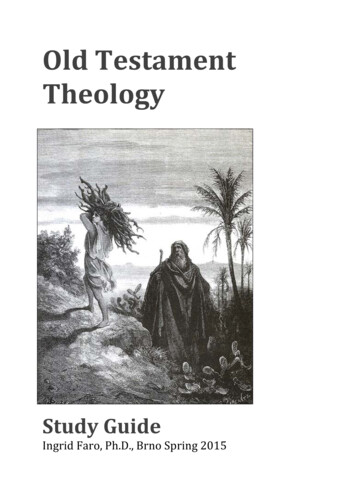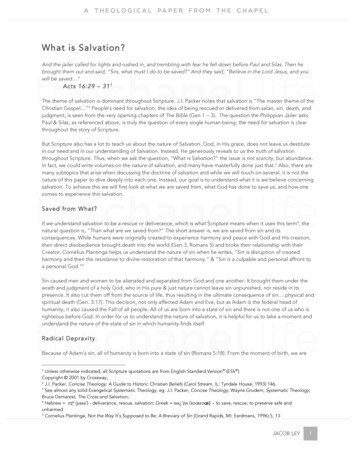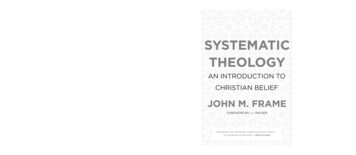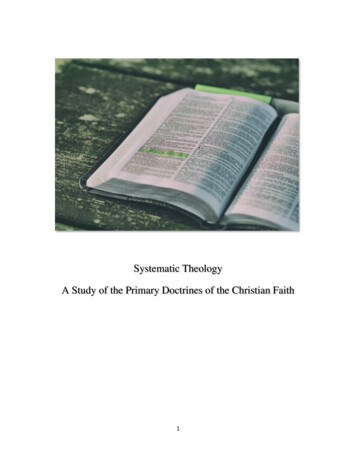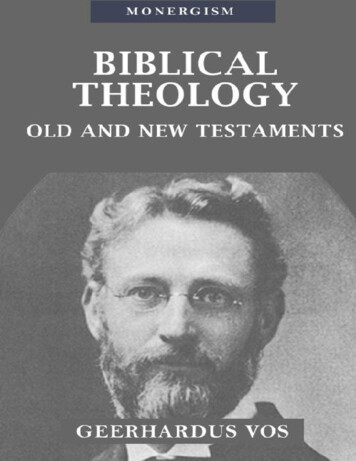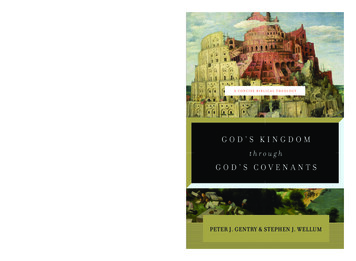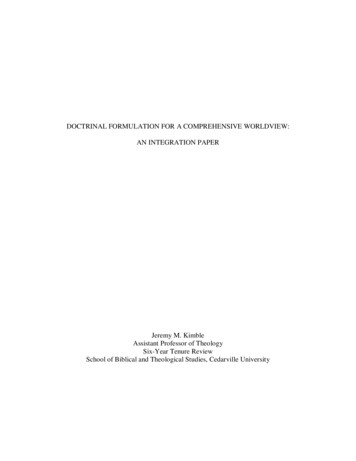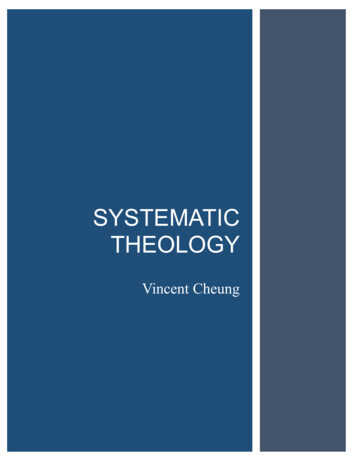
Transcription
Systematic Theology I - THEO5300New Orleans Baptist Theological SeminaryDivision of Theological & Historical StudiesFall 2017/Mondays 4:30–7:20 p.m.Dustin Turner, Ph.D.Adjunct Professor of TheologyPhone: 937-750-7348Email: dturner0904@yahoo.comTwitter: @drdustinturnerMission StatementThe mission of New Orleans Baptist Theological Seminary is to equip leaders to fulfill the GreatCommission and the Great Commandments through the local church and its ministries.The seminary has five core values.1. Doctrinal Integrity: Knowing that the Bible is the Word of God, we believe it, teach it,proclaim it, and submit to it. This course addresses Doctrinal Integrity specifically bypreparing students to grow in understanding and interpreting of the Bible.2. Spiritual Vitality: We are a worshiping community emphasizing both personal spiritualityand gathering together as a Seminary family for the praise and adoration of God andinstruction in His Word. Spiritual Vitality is addressed by reminding students that a dynamicrelationship with God is vital for effective ministry.3. Mission Focus: We are not here merely to get an education or to give one. We are here tochange the world by fulfilling the Great Commission and the Great Commandments throughthe local church and its ministries. This course addresses Mission Focus by helping studentsunderstand the biblical foundations for fulfilling the Great Commission and the GreatCommandments.4. Characteristic Excellence: What we do, we do to the utmost of our abilities and resourcesas a testimony to the glory of our Lord and Savior Jesus Christ. Characteristic Excellence isaddressed by preparing students to excel in their ability to interpret Scripture, which isfoundational to effective ministry.5. Servant Leadership: We follow the model of Jesus and exert leadership and influencethrough the nurture and encouragement of those around us. Servant Leadership is modeledby classroom deportment.The core value focus for this academic year is Servant Leadership.Curriculum CompetenciesNOBTS faculty members realize that all ministers need to develop specific competencies if theyare going to have an effective ministry. To increase the likelihood of NOBTS graduates having aneffective ministry, the faculty developed a competency-based curriculum after identifying seven
essential competencies necessary for effective ministry. All graduates are expected to have atleast a minimum level of competency in all of the following areas:1. Biblical Exposition: to interpret and communicate the Bible accurately.2. Christian Theological Heritage: To understand and interpret Christian theological heritageand Baptist polity for the church.3. Disciple Making: To stimulate church health through mobilizing the church for missions,evangelism, discipleship, and church growth.4. Interpersonal Skills: To perform pastoral care effectively, with skills in communication andconflict management.5. Servant Leadership: To serve churches effectively through team ministry.6. Spiritual and Character Formation: To provide moral leadership by modeling and mentoringChristian character and devotion.7. Worship Leadership: To facilitate worship effectively.The curriculum competencies addressed in this course are: Biblical Exposition and ChristianTheological Heritage.Course DescriptionThis first course in systematic theology introduces the student to the methodology of theology(Prolegomena) and the doctrines of revelation, God, humanity, and the person of Christ. Thebiblical foundations and the relevant historical developments are considered in construction ofa Christian understanding of each doctrine.Student Learning OutcomesThe student, by the end of the course, should:1. Be able to understand theological method and the doctrines of revelation, God,humanity, and the person of Christ biblically, historically, and systematically.2. Be able to apply theology by integrating these doctrines into a coherent,comprehensive, and consistent Christian worldview.3. Be able to communicate these doctrines in the particular ministry calling and context ofthelearner.Embedded Assignment - General Revelation Reflective EssayAll students enrolled in every section of Systematic Theology I have a common EmbeddedAssignment utilized in evaluating our projected Student Learning Outcomes. The assignment,listed below, is one of the Reflective Essay questions.1. Using the materials from your assigned systematic theology textbook and othertheological resources (like commentaries, other theological textbooks or monographs),briefly explain your understanding of the doctrine of general revelation, highlighting thedifferences between general and special revelation.2. What impact does the doctrine of general revelation have on your understanding ofmissions and evangelism?
3. Describe how the doctrine of general revelation can affect your communication of theGospel.4. This assignment should be 800-1200 words in length.The rubric below shows how the question will be evaluated in terms of addressing StudentLearning Outcomes.DOMAINLEVELUNDERSTANDINGAble tounderstand thedoctrinal topic.APPLICATIONAble to applyknowledge byrelating it to thebroaderChristianworldview.COMMUNICATIONAble tocommunicatethe doctrine toa ministryaudience.INADEQUATE(O PTS)BASICPT)(1 COMPETENT(2 PTS)GOOD(3 PTS)EXCELLENT(4 PTS)Required Texts Allison, Gregg R. Historical Theology: An Introduction to Christian Doctrine. Grand Rapids:Zondervan, 2011. (It is recommended that you read your assignments from this text AFTERREADING ERICKSON). Erickson, Millard. Christian Theology. 3d ed. Grand Rapids: Baker, 2013. 2 Books of the student’s choice from the Book Review ListRecommended TextsAllison, Gregg R. The Baker Compact Dictionary of Theological Terms. Grand Rapids: Baker,2016.Turabian, Kate L. A Manual for Writers of Research Papers, Theses, and Dissertations. 8th ed.Rev. Wayne C. Booth, Gregory G. Colomb, and Joseph M. Williams. Chicago: The Universityof Chicago Press, 2013.
Course Teaching MethodologyThe course will involve the following methodologies: Assigned Readings Classroom Lectures Classroom Discussions Written Assignments (Reflective Essays, Research Paper)The goal with these methodologies is for students to learn both inside and outside the classroom.Also, my goal is not for you to simply believe what I believe regarding particular doctrines but tothink critically about these doctrines and come to your own conclusions regarding thesedoctrines and assess their own strengths and weaknesses.Course Requirements1. Attendance/Participation (10%)Both attendance and participation in this class are vital. While there will be lecture, we will alsospend a considerable amount of time in discussion as well and so your presence will bothenhance the discussion as well as benefit from it. Because of this, attendance will be taken atevery meeting. According to the catalog, the maximum number of absences without failure forthis class is 3 (9 Classroom hours). Make it both a priority to be in class as well as be on time.2. Reading Quizzes (15%)Students will take 5 quizzes based on the assigned readings from Erickson and Allison. Thequizzes draw on key terms, the theological ideas of the authors, and significant figures andmovements in the history of theology. Quizzes can consist of multiple choice, true/false, fill-inthe-blank, short answer, and matching questions. Students are strongly encouraged to read ALLof the assigned reading materials before beginning the quiz. These are NOT open-bookquizzes.3. Reflective Essays (15%)Students will write 5 reflective essays based on the assigned readings from Erickson andAllison. Theology done well is not just learned knowledge but knowledge understood andknowledge applied. These essays will: Include (1) Explanation of the doctrine/topic, (2) Personal Reflection, & (3) MinistryApplication. Be 800-1200 words in length. Include both biblical as well as book citations. For both, use parenthetical citations (Joshua1:9) or (Erickson, Christian Theology, 324). Be graded on Understanding (5 pts) Organization (5 pts)
Communication (5 pts) Application (5 pts). Each essay is worth 20 points which makes the total of this assignment worth 100points.Essay #1: Using the materials from your assigned systematic theology textbook and othertheological resources (like commentaries, other theological textbooks or monographs),briefly explain your understanding of the doctrine of general revelation, highlightingthe differences between general and special revelation.What impact does the doctrineof general revelation have on your understanding of missions and evangelism?Describe how the doctrine of general revelation can affect your communication of theGospel.Essay #2: A common belief found in Christian circles is that “God hates the sin but loves thesinner.” This statement demonstrates the tension we find in understanding a God whois both loving and just. Using biblical texts as well as Erickson and Allison, does Godhate sin and love the sinner or simply hate the sin and the sinner? In answering thisquestion, look at the attributes of God and discuss how you reconcile God’s love andjustice. How does your view affect the way you see God and what sort of implicationsdoes this have for your ministry?Essay #3: How could a good and all-powerful God allow evil, pain, and suffering? This is thequintessential question atheists, agnostics, skeptics, and even Christians ask. UsingScripture and your primary texts, discuss how theologians answer this question (i.e.,theodices). How have you personally dealt with this question and how have you/willyou deal with the issue of the problem of evil in your ministry context?Essay #4: For centuries, theologians have debated how we are guilty of sin. Do we inherit only asin nature from Adam and are only guilty of the sin we commit or do we inherit both asin nature as well as Adam’s guilt? So, are we guilty before God only because our sinor also because of Adam’s guilt? How does your answer affect your personal lifebefore God? What might the implications of your view have on your ministry? (e.g.,parents with infants, etc.).Essay #5: After the Council of Chalcedon, the person of Jesus was for the most part finalized.Jesus is understood as being both fully divine and fully human. The Council alsodeveloped an understanding of the hypostatic union: two natures in one person. Whilemost Christians do not debate the two natures of Jesus in one person, sometimes it isdifficult to understand how his divine attributes exist within his humanity. Forinstance,how can Jesus be omnipresent when he has a physical body? How doyou make senseof Jesus’ divinity and humanity in one person and howdoes this affect yourunderstanding and worship of Jesus? Howdoes this affect how you teach and shareJesus in your ministry context?
4. Critical Book Reviews (30%) (15% Each)All students are required to read and review 2 books from the below list: Putman, Rhyne R. In Defense of Doctrine: Evangelicalism, Theology, and Scripture.Minneapolis: Fortress Press, 2015. (Theological Method) Barrett, Matthew. God’s Word Alone: The Authority of Scripture. Grand Rapids:Zondervan, 2016. (Special Revelation) Yarnell, III, Malcolm B. God the Trinity: Biblical Portraits. Nashville: B & HAcademic, 2016. (Theology Proper) Keathley, Kenneth, J. B. Stump, and Joe Aguirre. Old-Earth or Evolutionary Creation?Discussing Origins with Reasons to Believe and Biologos. Downers Grove, IL: IVPAcademic, 2017. (Anthropology) Harwood, Adam. The Spiritual Condition of Infants: A Biblical-Historical Survey andSystematic Proposal. Eugene, OR: Wipf and Stock, 2011. (Hamartiology) Wellum, Steven J. God the Son Incarnate: The Doctrine of Christ, Foundations ofEvangelical Theology, edited by John S. Feinberg. Wheaton: Crossway, 2016.(Christology)The review should include:(1) a bibliographic entry(2) a brief biographical data about the author (e.g., his position, degrees, research interests,and other works) (3-4 sentences)(3) an assessment of the main purpose and/or thesis of the book (1 paragraph)(4) a concise summary of the book’s contents (NO MORE THAN A THIRD OF THETOTAL REVIEW SHOULD BE SUMMARY)(5) a thorough critical analysis of the book (e.g., strengths, weaknesses)(6) a discussion of the relevance of the book to your particular ministry(7) a conclusion with a recommendation or dismissal.The reviews should be between 2000-3000 words and should conform to Turabian. Becausebook reviews are primarily about one source, use parenthetical citations for the primarytext and footnotes only for external sources.A few questions to consider when preparing for a critical book review: What is the mainpurpose or thesis of this book? To whom is this book written? Did the author fulfill his purpose?What are some of the author’s working assumptions (e.g., his denominational background, fieldof research, or view of Scripture)? Does the author provide strong biblical, philosophical, and
historical support for his positions? Are there any points of contact between this book/writer andother texts read during the course of the semester? How might the content of this book affectministry in the local church or ministry within your particular calling? Are there any ideas thatchanged your particular way of thinking on the subject matter at hand? Would you recommendthis book to someone else? A papers (93-100) clearly state the book’s thesis, successfully and succinctly outline itsargument in its own terms, demonstrate advanced critical engagement with the argumentand content of the book, make clear and well structured arguments, and exhibit aproficient grasp of grammar, spelling, and style. B papers (85-92) clearly state the book’s thesis, show an attempt to understand the bookon its own terms and critically reflect on the issues at hand, make arguments, and showsufficiency in grammar, spelling, and style. C papers (77-84) state the book’s thesis, present the content of the book, raisepreliminary critical questions for further evaluation, limit evaluation to approval ordisapproval of the author’s arguments, and make repeated mistakes in grammar, spelling,and style. D (70-76) and F (0-69) papers lack evidence of grasping the book’s thesis and content,limit evaluation to preformed judgments without serious consideration of the book’sideas, contain major grammatical, spelling, and stylistic errors, and demonstrate little orno attempt to proofread.5. Theological Research Paper (30%)All students are required to write a brief research paper (12-15 double-spaced pages in length)on a particular doctrinal topic/question. Students may choose from the following topics or seekapproval from the professor on another topic. A more focused paper is usually a better productthan an overly broad paper (e.g., like trying to cover all the doctrine of Christ in ten pages!).Students may select a doctrinal topic and seek to investigate how a particular theologian inhistory addressed that issue, or one may start with a particular theologian and investigate his orher unique theological perspectives (e.g., Calvin’s understanding of imputation or Karl Barth’sdoctrine of inspiration). Students may also feel free to pick one of the doctrinal topics below andoffer a biblical, philosophical, and historical analysis of the doctrine.Possible Paper Topics (or Mix and Match)
The Inspiration of ScriptureThe Authority of ScriptureBiblical InerrancyGeneral Revelation and World ReligionsArguments for God’s ExistenceGod’s Incommunicable AttributesGod’s Communicable AttributesThe TrinityCreationAnselm of CanterburyArminius, JamesAthanasiusAugustineBarth, KarlBrunner, EmilBultmann, RudolfCalvin, JohnCappadocian Fathers, TheGod and EvilThe Image of GodThe Imputation of Adam’s SinTotal DepravityThe Age of AccountabilityThe Historical JesusThe Humanity of ChristThe Peccability/Impeccability of ChristThe Hypostatic UnionEdwards, JonathanHodge, CharlesJustin MartyrLuther, MartinMullins, E. Y.OrigenSchleiermacher, FriedrichThomas AquinasWesley, JohnZwingli, HuldruchPLEASE READ THE DOCUMENTS IN THE “PAPER WRITING RESOURCES”SECTION BEFORE WRITING—particularly John Frame’s paper “How to Write aTheological Research Paper.”Help for Writing Papers at “The Write Stuff”NOBTS maintains a Writing Center designed to improve English writing at the graduate level.Students can receive writing guides, tips, and valuable information to help in becoming a betterwriter.Theological Research Paper Grading RubricSuper Paper(B —A)Competent Paper(B—B )Adequate Paper(C —B-)Weak Paper(F—C)
Super Paper(B —A)Competent Paper(B—B )Adequate Paper(C —B-)Weak Paper(F—C)ThesisA superior paper has aclearly articulatedthesis (“In this paper, Iwill argue that.”),which is explicitlystated in the paper’sintroduction,determines theorganization of thepaper, determines whatcounts as primary andas secondary sources,determines whatevidence/considerations are included andexcluded, and isaddressed in thepaper’s conclusion.A competent paperincludes a thesisstatement that isexplicitly stated and isaddressed in the paper’sconclusion, but whichdoes not determine in atransparent way thesubstance and flow ofthe paper. The paperretains materialirrelevant to its centralargument.An adequate paper is A weak paper makes noprimarily descriptive in attempt to define thenature, lacking anyquestion and lacks avisible argument or well coherent structure.articulated thesis. It maybe organized topically,but without reference toan objective guiding thepaper. It containsirrelevant data.ResearchA superior paperA competent paperdemonstrates itsdemonstrates theauthor’s ability toauthor’s developingconduct and represent ability to conduct andgraduate-level research represent graduate-level— i.e., research thatresearch. It begins todistinguishes secondary distinguish secondaryand primary sources; and primary sources,considers relevantsamples sourcessources, both classical appropriate to the study,and up-to-date, andand demonstrates someappropriate to the aims work in a researchof the paper; islibrary.conversant with“essential” and“critical”commentaries; andconsiders relevantpapers from scholarlyjournals as well asbooks.An adequate paperA weak paper fails todemonstrates thedemonstrate its author’sauthor’s emergingability to conduct andability to conduct and represent graduate-levelrepresent graduate-level research. Its treatmentresearch It confusesis superficial and it failssecondary and primary to interact withsources, tends to depend secondary literature, oron marginal and/or out- it depends entirely onof-date sources, draws secondhand informationgenerally onfrom marginal and/or“devotional” orout-of-date sources.“homiletical”commentaries,
CriticalEngagementSuper Paper(B —A)Competent Paper(B—B )A superior paperdemonstrates graduatelevel competence withregard to independenceof thought,epistemologicalhumility, and criticalinquiry.A competent paperAn adequate paperA weak paper has thedemonstrates thedemonstrates emerging appearance of a collageauthor’s developingcritical acumen. In some of the opinions ofcritical acumen,cases, the voice of the others, accepts theevidencing insight and author is muted, so that views of others withoutpersonal response. The his or her contribution is question, makes noauthor’s voice is clear unclear or only partially personal contribution,even when it is not well- developed. In otherdisplays arrogance indeveloped.cases, the authorprematurely dismissingmisrepresents and/or is the views of others,too dependent on theand/or is blind to itsviews of others.own presuppositionsand/or weaknesses.Presentation A superior paper ispresented in aprofessional manner interms of spelling,sentence and paragraphconstruction, andacceptable form/style.A competent paperevidences only minorand infrequent errors inspelling and grammar,and/or lapses of style.Adequate Paper(C —B-)An adequate paperevidences repeatedlapses in form/style,spelling errors,grammaticalirregularities — enoughso as to constitute anobstacle to reading andunderstanding.Weak Paper(F—C)A weak paper containsmajor grammaticalerrors (e.g., sentencefragments, subject-verbdisagreement),evidences no realattempt at proofreading,and/or does notconform to anacceptable form/style.Extra Credit Opportunities1. Greer-Heard ReportStudents will attend the Nov. 10–11, 2017, Greer-Heard Point-Counterpoint event on “TheMeaning of the Atonement,” and write a summary and critique of the event (including everypresentation). The report should include some professional biographical data on each presenteras well as their major points of content. Students should critically assess their arguments andstate their own position in light of what they heard at the forum. The report should be 1,200–1,500 words. The event will be held on the NOBTS campus in the Leavell Chapel. If a student isunable to attend the Greer-Heard forum in person, the assignment may be completed from CDsor MP3s of the event. The event is free for NOBTS students, faculty, staff, and their spouses. Formore information, see www.greerheard.com. Students can earn up to 5 points on their final gradewith submission.2. ETS Annual MeetingStudents attending the annual national meeting of the Evangelical Theological Society inProvidence, RI on November 15-17, 2017 may write a 1000-word report on papers attended (atleast three). For registration information, please visit http://www.etsjets.org. Students can earn upto 5 points on their final grade with submission.Evaluation of Grade
The student's grade will be determined as follows: Attendance/Participation10% Reading Quizzes15% Reflective Essays15% Critical Book Reviews (2)30% (15% Each) Theological Research Paper30%TOTAL100%NOBTS Grading ScaleA - 93–100B - 85–92C - 77–84D - 70–76F - Below 70Late WorkBecause life and ministry happens, late work will be accepted—but not without penalty. Forevery day an assignment is late, five points will be taken off. No assignment over two weeks latewill be accepted. Failure to submit every assignment will result in failure of the course.Technical AssistanceFor assistance regarding technology, consult ITC (504-816-8180) or the following websites:1. Selfserve@nobts.edu - Email for technical questions/support requests with theSelfserve.nobts.edu site (Access to online registration, financial account, online transcript,etc.)2. BlackboardHelpDesk@nobts.edu - Email for technical questions/support requests with theNOBTS Blackboard Learning Management System NOBTS.Blackboard.com.3. ITCSupport@nobts.edu - Email for general technical questions/support requests.4. www.NOBTS.edu/itc/ - General NOBTS technical help information is provided on thiswebsite.Plagiarism on Written AssignmentsNOBTS has a no tolerance policy for plagiarism. Plagiarism in certain cases may result inexpulsion from the seminary. See the NOBTS Student Handbook for definition, penalties, andpolicies associated with plagiarism. Plagiarism is: borrowing another person’s ideas without citing the work. If information can be found infive or more sources, it is considered common knowledge and does not need to be cited.When in doubt, cite. borrowing another person’s phrases or sentences without quoting the work. resubmitting work you completed for another class. Even if you wrote the original paper,it is cheating to submit the work a second time.
Course ScheduleLectures, Readings, and Assignments ScheduleDateClass Topic8/21Introduction8/28Prolegomena andTheological Method9/4AssignmentsReadings / Quiz MaterialsRead SyllabusReading QuizErickson, chs. 1, 3-5Labor Day9/11General Revelation andNatural TheologyReflective Essay #1Erickson, ch. 6Allison, ch. 99/18Special Revelation andBibliology, pt. 1Reading QuizErickson, chs. 7-8, 10Allison, chs. 3-49/25Special Revelation andBibliology, pt. 2Book Review 1 DueErickson, ch. 9Allison, ch. 5, 7, 810/2Theology ProperReflective Essay #2Erickson, chs. 11-13Allison, ch. 1010/9The TrinityReading QuizErickson, ch. 14Allison, ch. 1110/16Fall Break10/23CreationBook Review 2 DueErickson, ch. 16Allison, ch. 1210/30ProvidenceReflective Essay #3Erickson, chs. 17-18Allison, ch. 1311/6TheologicalAnthropologyReading QuizErickson, chs. 21-23Allison, ch. 1511/13HamartiologyReflective Essay #4Erickson, chs. 25-29Allison, ch. 1611/20Thanksgiving Break11/27Christology, pt. 1Reading QuizErickson, chs. 30, 3212/4Christology, pt. 2Reflective Essay #5Erickson, chs. 31, 33Allison, ch. 17
12/11Research Paper Due @ 6PMSelected BibliographyTheological MethodClark, David K. To Know and Love God: Method for Theology. In Foundations of EvangelicalTheology, ed. John S. Feinberg. Wheaton: Crossway, 2003.Putman, Rhyne R. In Defense of Doctrine: Evangelicalism, Theology, and Scripture.Minneapolis: Fortress Press, 2015.Yarnell, Malcolm. The Formation of Christian Doctrine. Nashville: B & H Academic, 2007.Doctrine of RevelationBarrett, Matthew. God’s Word Alone: The Authority of Scripture. Grand Rapids: Zondervan,2016.Brunn, Dave. One Bible, Many Versions: Are All Translations Created Equal? Downers Grove:IVP, 2013.Cowan, Steven B., and Terry L. Wilder, ed. In Defense of the Bible: A ComprehensiveApologeticfor the Authority of the Bible. Nashville: B & H Academic, 2013.Fee, Gordon and Douglas Stuart. How to Read the Bible for All Its Worth. Grand Rapids:Zondervan, 2003.Henry, Carl F. H. God, Revelation and Authority. 6 Vols. Wheaton: Crossway, 1999.McDonald, Lee Martin. Formation of the Bible: The Story of the Church’s Canon. Peabody,MA: Hendricksen, 2012.Merrick, J. and Stephen M. Garrett, eds. Five Views on Biblical Inerrancy. Counterpoints: Bibleand Theology. Grand Rapids: Zondervan, 2013.Piper, John. A Peculiar Glory: How the Christian Scriptures Reveal Their CompleteTruthfulness. Wheaton: Crossway, 2016.Doctrine of GodBray, Gerald. The Doctrine of God. Contours of Theology. Edited by Gerald Bray. DownersGrove, IL: IVP, 1993.Erickson, Millard J. What Does God Know and When Does He Know It?: The CurrentControversy over Divine Foreknowledge. Grand Rapids: Zondervan, 2006.Feinberg, John S. No One Like Him: The Doctrine of God. Foundations of Evangelical Theology.Edited by John S. Feinberg. Wheaton: Crossway, 2005.Hanson, R. P. C. The Search for the Christian Doctrine of God. Grand Rapids: Baker Academic,2006.Huffman, Douglas, ed. God Under Fire. Grand Rapids: Zondervan, 2002.Kärkkäinen, Veli-Matti. Doctrine of God: A Global Introduction. Grand Rapids: BakerAcademic, 2004.
Letham, Robert. The Holy Trinity: In Scripture, History, Theology, and Worship. Phillipsburg,NJ: P & R, 2005.Packer, J. I. Knowing God. Downers Grove, IL: IVP, 1993.Prothero, Stephen. God is Not One: The Eight Rival Religions that Run the World. New York:Harper Collins, 2010.Sanders, Fred. The Deep Things of God: How the Trinity Changes Everything. Wheaton:Crossway, 2010.Tiessen, Terrance. Providence & Prayer: How Does God Work in the World? Downers Grove:IVP Academic, 2000.Wise, Kurt. Faith, Form, and Time: What the Bible Teaches and Science Confirms aboutCreation and the Age of the Universe. Nashville: B & H, 2002.Yarnell, III, Malcolm B. God the Trinity: Biblical Portraits. Nashville: B & H Academic, 2016.Doctrine of ManBlocher, Henri. Original Sin: Illuminating the Riddle. New Studies in Biblical Theology 5.Edited by D. A. Carson. Downers Grove: InterVarsity, 1997.Gagnon, Robert A. J. The Bible and Homosexual Practice: Texts and Hermeneutics. Nashville:Abingdon, 2001.Harwood, Adam. The Spiritual Condition of Infants: A Biblical-Historical Survey and SystematicProposal. Eugene, OR: Wipf and Stock, 2011.Keathley, Kenneth, J. B. Stump, and Joe Aguirre. Old-Earth or Evolutionary Creation?Discussing Origins with Reasons to Believe and Biologos. Downers Grove, IL: IVPAcademic, 2017.Pierce, Ronald W. and Rebecca Merrill Groothuis, eds. Discovering Biblical Equality:Complementarity without Hierarchy. Downers Grove, IL: IVP Academic, 2005.Piper, John and Wayne Grudem, ed. Recovering Biblical Manhood and Womanhood. Wheaton:Crossway, 1991.Plantinga, Cornelius. Not the Way It’s Supposed to Be: A Breviary of Sin. Grand Rapids:Eerdmans, 1995.Smith, David L. With Willful Intent: A Theology of Sin. Eugene, OR: Wipf & Stock, 2003.Doctrine of Christ (The Person of Christ)Bock, Darrell. Studying the Historical Jesus. Grand Rapids: Baker, 2002.Cole, Graham A. The God Who Became Human: A Biblical Theology of Incarnation. NewStudies in Biblical Theology. Edited by D. A. Carson. Downers Grove, IL: IVP Academic,2013.Erickson, Millard J. Who’s Tampering with the Trinity?: An Assessment of the SubordinationDebate. Grand Rapids: Kregel, 2009.Grillmeier, Aloys. Christ in Christian Tradition. 2 Vols. Louisville: Westminster John Knox,1988.Macleod, Donald. The Person of Christ. Contours of Theology. Edited by Gerald Bray. DownersGrove, IL: IVP, 1998.Stott, John. The Incomparable Christ. Downers Grove: IVP, 2001.
Wellum, Steven J. God the Son Incarnate: The Doctrine of Christ, Foundations of EvangelicalTheology, edited by John S. Feinberg. Wheaton: Crossway, 2016.Biblical TheologiesChilds, Brevard S. Biblical Theology of the Old and New Testaments: Theological Reflection onthe Christian Bible. Minneapolis: Fortress, 1992.Goldsworthy, Graeme. According to Plan: The Unfolding Revelation of God in the Bible.Downers Grove: IVP, 1991.Scobie, Charles H. H. The Ways of our God: An Approach to Biblical Theology. Grand Rapids:Eerdmans, 2003.Historical TheologiesAllison, Gregg R. Historical Theology: An Introduction to Christian Doctrine. Grand Rapids:Zondervan, 2011Garrett, James Leo, Jr. Systematic Theology: Biblical, Historical, & Evangelical. 2 Vols. GrandRapids: Eerdmans, 1995.McGrath, Alister. Christian Theology: An Introduction. 5th ed. Hoboken, NJ: Wiley-Blackwell,2011.Olson, Roger E. The Story of Christian Theology: Twenty Centuries of Tradition and Reform.Downers Grove, IL: IVP Academic, 1999
Allison, Gregg R. Historical Theology: An Introduction to Christian Doctrine. Grand Rapids: Zondervan, 2011. (It is recommended that you read your assignments from this text AFTER READING ERICKSON). Erickson, Millard. Christian Theology. 3d ed. Grand Rapids: Baker, 2013.
